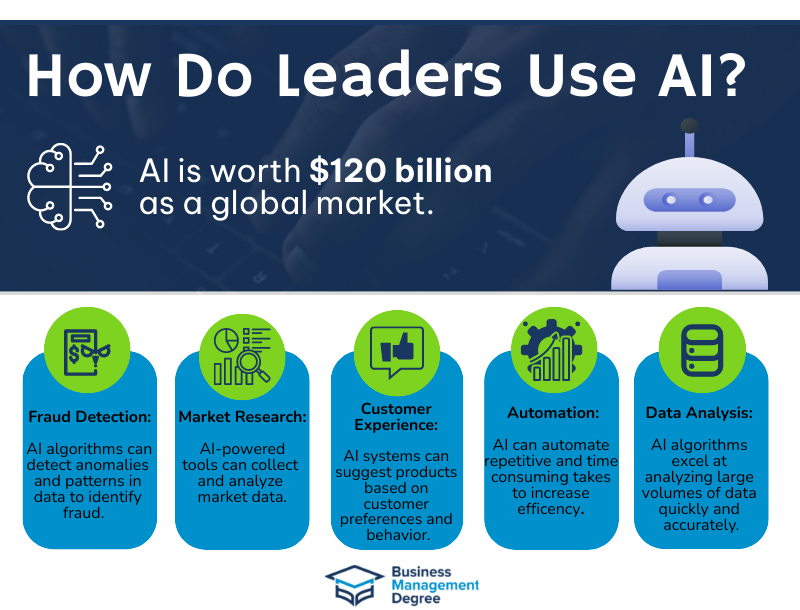Find Your Perfect Business Degree
www.business-management-degree.net is an advertising-supported site. Featured or trusted partner programs and all school search, finder, or match results are for schools that compensate us. This compensation does not influence our school rankings, resource guides, or other editorially-independent information published on this site.
The best AI courses for executives and leaders are flexible programs that focus on providing a strategic understanding of AI and its implications for business. Are you busy with day-to-day management, but know you should get an edge with formal AI exposure or certification? There are several excellent AI courses specifically for executives and leaders.
The impact of Artificial Intelligence (AI) on the world is significant and multi-faceted. AI technologies have led to increased automation in various industries resulting in improved efficiency, reduced costs, and allowed businesses to streamline processes. Leaders and executives must understand AI and its impact on their business brand and culture. They must know how to implement AI into their business to improve productivity and manage AI risk.
Featured Programs

Methodology for the Best AI Programs for Executives and Leaders
These courses, classes, and degrees have several factors that put them ahead of other programs. We reviewed the nature of the coursework, the degree of thoroughness and complexity of the curriculum, the format: online or hybrid availability, and whether it teaches coursework that gives students more than just classroom experience.
In developing this list, the analytics team at Business Management Degree chose not to list the schools in an ordered way. Instead, we highlighted the very best programs, all of which have their unique strengths. To learn more about how these programs were selected, see our Methodology page.
Tuition rates are subject to change. All data is accurate at time of publication. First reviewed in January 2024.
What are the Best AI Programs for Business Managers?
Several AI courses cater specifically to executives and leaders wanting to understand and leverage artificial intelligence. These courses often provide a high-level overview of AI concepts, strategic implications, and practical applications. Here are some recommended AI courses for executives and leaders.
1. AI for Everyone by Coursera (offered by Andrew Ng)

Provider: Coursera
Instructor: Andrew Ng
Duration: 3 weeks at 2 hours a week
Description: This course is designed for non-technical professionals who want to understand the impact of AI on their businesses. It covers a broad range of AI topics, including machine learning, deep learning, and AI strategy. Taught by Andrew Ng, AI for Everyone is one of the best courses for overall AI training for business leaders by industry experts. At the end, you can earn a career certificate and a credential to your LinkedIn profile, resume, or CV.
Dr. Andrew Ng is a global leader in Artificial Intelligence (AI). He was chief scientist at Baidu, the founding lead of the Google Brain Team, founder of DeepLearning.AI, Founder & CEO of Landing AI, General Partner at AI Fund, Chairman & Co-Founder of Coursera, and an Adjunct Professor at Stanford University’s Computer Science Department.
More Info: AI for Everyone
2. Artificial Intelligence: Implications for Business Strategy

Provider: MIT Sloan Executive Education
Duration: 6 weeks, 6 to 8 hours per week
Description: The Massachusetts Institute of Technology (MIT) Sloan School of Management and the MIT Computer Science and Artificial Intelligence Laboratory offer AI training for business leaders. This online executive program has an AI course that focuses on the organizational and managerial skills to lead the integration of AI in business. This program is for executives who want to grasp the business implications of AI. It covers strategic considerations and practical approaches to incorporating AI into business strategies.
More Info: Artificial Intelligence: Implications for Business Strategy
3. Artificial Intelligence course

Provider: Berkeley Executive Education at UC Berkeley Haas School of Business
Duration: 2 months with 4 to 6 hours per week of study
Description: This online AI for executives course is ideal for senior business leaders overseeing the integration of AI into their organization. Over two months, students learn how to organize and manage successful AI application projects and also avoid common pitfalls of this new technology. At the end, students earn a certificate of completion from UC Berkeley Executive Education.
More Info: Artificial Intelligence course
4. AI Applications for Growth online course

Provider: Kellogg Executive Education at Northwestern
Duration: 2 months, 4 to 6 hours per week
Description: This AI for executives course is designed to assist you in harnessing the power of AI to create customer value and gain a competitive advantage. Kellogg Executive Education recently added a Generative AI lesson to this program. In contrast to traditional AI, it empowers organizations with a focus on the generation of new, creative content. So this course from Northwestern is ideal for professionals working in marketing, advertising, or entertainment.
More Info: AI Applications for Growth
5. AI for Business Leaders NanoDegree

Provider: Uacity
Duration: 2 months
Description: This nano degree program is designed for leaders and executives who want to understand AI at a strategic level. It covers AI fundamentals and ethics and also provides insights into leading AI teams and projects.
More Info: AI for Business Leaders
6. Artificial Intelligence for Business Leaders

Provider: LinkedIn Learning
Instructor: Doug Rose
Duration: 1h 33m online course
Description: This course is tailored for business professionals and focuses on the practical applications of AI and machine learning in business scenarios. Doug explains how artificial intelligence can help find business solutions in logistics, market analysis, customer support, and also inventory prediction. Additionally, it covers the strategic aspects of AI implementation.
More Info: Artificial Intelligence for Business Leaders
7. Artificial Intelligence in Business: Creating Value with Machine Learning

Provider: Harvard Professional & Executive Development, Division of Continuing Education (DCE)
Duration: 2 consecutive days, live online or on campus
Description: This Artificial Intelligence training for business leaders focuses on the strategic and practical aspects of implementing AI in business. It covers AI technologies, their impact on business models, and strategies for incorporating AI into organizations.
More Info: Artificial Intelligence in Business: Creating Value with Machine Learning
8. AI for Decision Making: Business Strategies and Applications

Provider: Wharton Online at the University of Pennsylvania
Duration: 3 months, blended learning
Description: This AI certification program program from Wharton Online is for executives and leaders seeking a competitive edge in business using AI. Participants learn how to leverage Big data, Machine Learning, and Generative AI. This Artificial Intelligence for Business Leaders online class is three months and covers real-world examples for a practical understanding. At completion, students can earn a certificate.
More Info: AI for Decision Making: Business Strategies and Applications
9. Harnessing AI for Breakthrough Innovation and Strategic Impact

Provider: Stanford University School of Business Executive Education
Duration: one week, in person
Description: Stanford’s AI management course is designed for senior executives and decision-makers. It covers foundational concepts of AI, practical applications, and the strategic implications of AI for business.
More Info: Harnessing AI for Breakthrough Innovation and Strategic Impact
10. AI for Business Leaders

Provider: Udemy
Duration: 1-hour on-demand video
Description: This AI for business leaders online course from Udemy gives an overview of why Artificial Intelligence is important. It also covers the possible impacts of Artificial Intelligence on businesses and how to plan for AI implementation.
More Info: AI for Business Leaders

What is Artificial Intelligence?
Computer systems that can perform tasks that typically require human intelligence, such as learning, reasoning, problem-solving, and perception are referred to as Artificial Intelligence (AI). It involves the creation of algorithms and models that enable machines to process information, adapt to changing situations, and make autonomous decisions. AI technologies encompass a range of applications, from natural language processing and image recognition to machine learning and robotics.
Machine Learning (ML) is a subset of artificial intelligence that focuses on the development of algorithms and statistical models that enable computers to improve their performance on a specific task through experience or data. Instead of being explicitly programmed for a particular task, machine learning systems use patterns and inference to learn from data and make predictions or decisions. The primary goal of machine learning is to enable machines to automatically learn and improve their performance allows them to handle complex tasks and adapt to new information.
What is AI’s Impact on the World?
The impact of Artificial Intelligence (AI) on the world is significant and multi-faceted.
| Key Point | Description |
|---|---|
| Job Displacement and Creation | While AI has automated certain tasks, it has also led to concerns about job displacement. However, it has simultaneously created new job opportunities in AI development, maintenance, and other related fields. |
| Healthcare Advancements | AI is being utilized in healthcare for diagnostics, drug discovery, personalized medicine, and managing patient data. This has the potential to revolutionize healthcare and improve patient outcomes. |
| Global Economy | AI is influencing the global economy by driving innovation, creating new markets, and impacting international trade. Countries investing in AI research and development are likely to gain a competitive advantage. |
| Enhanced User Experience | AI is employed in various applications to enhance user experiences, such as virtual assistants, recommendation systems, and personalized content delivery. |
| Social Impact | AI technologies have social implications, affecting how people interact, communicate, and access information. Issues such as algorithmic bias and the digital divide need careful consideration. |
Who Are AI Courses for Executives For?
AI courses for executives are designed for senior leaders, decision-makers, and professionals in leadership positions within organizations. These courses cater to individuals who may not have a technical background in artificial intelligence but are responsible for making strategic decisions about the integration and implementation of AI in their respective businesses. The target audience typically includes:
C-Suite Executives
CEOs, CTOs, CIOs, and other top-level executives need to understand how AI can impact overall business strategy and operations.
Business Leaders and Managers
Senior managers, business unit heads, and departmental leaders who want to leverage AI to improve processes, decision-making, and overall business performance. Senior-level executives, policymakers, and nonprofit leaders who recognize the importance of AI and want to responsibly harness it
Entrepreneurs
Business owners and entrepreneurs looking to understand how AI can be applied to enhance innovation, competitiveness, and growth in their ventures. Business heads who want to gain this AI certification to explore and implement AI opportunities
Board Members
Individuals serving on the boards of organizations need to grasp the strategic implications and risks associated with AI adoption. Decision-makers from any industry who work with internal or external technology teams
Policy Makers
Government officials, policymakers, and regulatory authorities are interested in understanding the societal and economic impact of AI and shaping policies accordingly.
Non-Technical Professionals
Professionals from non-technical backgrounds, such as marketing, finance, human resources, and legal, need to comprehend the implications of AI on their specific domains. Mid-career professionals who want to upskill by learning in-demand AI technologies and tools
Industry Leaders
Leaders from various industries, including healthcare, finance, manufacturing, and more, who want to explore industry-specific applications of AI.
These courses are tailored to provide a high-level overview of AI concepts, applications, and strategies without delving into intricate technical details. They focus on helping executives make informed decisions regarding AI adoption, manage AI projects, and navigate the ethical and societal considerations associated with AI implementation. The goal is to empower leaders to harness the benefits of AI for organizational success.
Why Take an AI Course for Executives?
An AI management course or Machine Learning class for executives can benefit professionals in many ways. Many classes cover integrating AI and ML into business strategies and decision-making processes. A course may also help executives identify opportunities for leveraging AI to improve efficiency, productivity, and competitiveness.
Additionally, many executive courses in AI training and Machine Learning address AI and ML implementation’s ethical and legal implications. So, executives know how to manage data privacy, security risks, and biases in AI algorithms.
What are the Most Important Topics in Modern Artificial Intelligence?
Some of the most important topics in modern artificial intelligence that affect businesses include:
- Machine Learning
- Deep Learning
- Natural Language Processing (NLP) for Text Analysis
- Supervised and Unsupervised Learning
- Reinforcement Learning
- Graph Neural Networks (GNNs)
- Multi-Task and Meta-Learning
Many executive education programs allow participants to tailor their learning experience based on their industry, role, and specific interests. An AI Management Course or Machine Learning for Executives is designed to empower professionals with the knowledge and skills needed to navigate the evolving landscape of AI and ML, make informed strategic decisions, and lead their organizations into the future of technology-driven business environments.
How are Leaders Using AI
Leaders and executives are increasingly leveraging AI in various ways to enhance productivity, decision-making, and overall efficiency in the workplace. These applications of AI in the workplace demonstrate how leaders and executives are strategically integrating technology to drive innovation, streamline operations, and gain a competitive edge.

How is AI Transforming Business?
AI and machine learning (ML) are used across different business sectors to enhance efficiency, improve decision-making, and create new opportunities. Artificial Intelligence (AI) transforms business processes by impacting efficiency, decision-making, customer experiences, and overall operations. Here are several ways in which AI is making a significant impact on businesses.
1. Data Analysis and Insights
AI enables the efficient analysis of large volumes of data. It can improve decision-making based on data-driven insights. AI-powered predictive analytics helps companies to anticipate trends, customer behavior, and market changes. Machine learning models can predict future outcomes and trends based on historical data. They are widely used for demand forecasting, inventory management, and financial planning.
2. Automation and Efficiency
Businesses use AI and ML to automate routine tasks and optimize processes. AI-powered automation streamlines common tasks, reducing the need for manual intervention. Using AI can save time, reduce errors, and improve overall efficiency. For example, Robotic Process Automation (RPA) and intelligent bots are used for tasks such as data entry, customer support, and essential communication.
3. Customer Service and Experience
Chatbots, virtual assistants, and sentiment analysis tools enhance customer service by responding instantly to queries, handling routine tasks, and offering personalized interactions. These AI tools help analyze customer preferences and behavior, leading to more personalized and targeted marketing strategies. AI employed in CRM systems can significantly enhance customer interactions.
4. Supply Chain Optimization
AI facilitates better supply chain management by predicting demand, optimizing inventory levels, and improving logistics and delivery processes. Predictive maintenance powered by AI helps reduce downtime and improve the reliability of equipment and machinery. Machine learning is applied to optimize supply chain processes by predicting demand, improving logistics, and minimizing disruptions. All these tools can help businesses streamline operations and reduce costs.
5. Cybersecurity
AI can detect and prevent cybersecurity threats by identifying anomalies in patterns and then responding to security incidents in real-time. Machine learning algorithms can adapt and evolve to new types of cyber threats, providing a proactive defense mechanism.
6. Human Resources and Talent Management
In recruitment processes, AI is used to screen resumes, conduct initial interviews, and identify suitable candidates. Additionally, employee engagement and performance can be monitored using AI tools, providing insights for better workforce management and workforce planning.
7. Personalization and Marketing
Businesses can create highly personalized Marketing and Advertising campaigns by analyzing customer preferences, behaviors, and demographics. Recommendation engines powered by AI can enhance a customer experience by suggesting products or services tailored to individual preferences. Typical applications in this sector include ad targeting, personalized recommendations, and dynamic pricing.
8. Financial Analysis and Fraud Detection
Machine Learning and AI models are used in financial institutions for credit scoring, fraud detection, and algorithmic trading. AI algorithms analyze financial data to identify trends, assess risks, and make investment decisions. Fraud detection systems use AI to recognize unusual patterns and behaviors, helping in the early detection of fraudulent activities. AI tools can also assess risks, identify investment opportunities, and optimize portfolio management in finance and risk management.
9. Healthcare Innovation
Patient care, diagnostics, personalized medicine, and drug discovery are some areas where AI is revolutionizing the healthcare industry. Predictive analytics and machine learning can help healthcare providers make better decisions based on patient data. AI aids in medical diagnostics, drug discovery, and personalized medicine. Machine learning models analyze patient data, identify patterns, and assist in treatment planning.
10. Innovations and Research
AI accelerates research and development processes, helping businesses innovate and bring new products or services to market more quickly. It facilitates exploratory research by analyzing vast amounts of data and identifying patterns or correlations that may not be apparent through traditional methods.
11. Smart Personal Assistants
Virtual assistants leverage AI to understand and respond to user commands. These assistants, like Alexa, are used for the hands-free operation of devices and for accessing information. These applications demonstrate the diverse ways in which AI and machine learning are transforming traditional business processes and driving innovation across industries. Businesses continue to explore new use cases as these technologies evolve.
What are the Problems with AI?
While AI presents numerous opportunities for businesses, it also comes with challenges, including ethical considerations, privacy concerns, and the need for skilled professionals to develop and manage AI systems. Nonetheless, the transformative impact of AI on businesses is undeniable, and organizations that strategically adopt and integrate AI technologies are likely to gain a competitive advantage in their respective industries.
Why Take an Artificial Intelligence Course?
The rise of AI has emphasized the need for individuals to acquire new skills. There is an increased focus on education and training programs to prepare people for the changing job landscape. An AI management course or Machine Learning class for executives can benefit professionals in many ways. Many classes cover integrating AI and ML into business strategies and decision-making processes. A course may also help executives identify opportunities for leveraging AI to improve efficiency, productivity, and competitiveness. Additionally, many executive courses in AI training and Machine Learning address the ethical and legal considerations associated with AI and ML implementation. So, leaders and executives are equipped with the knowledge to manage data privacy, security risks, and biases in AI algorithms.
Your Career and AI
An AI Management Course or Machine Learning for Executives can be highly beneficial for professionals. Learning how to integrate AI and ML into business strategies and decision-making processes. Helps executives identify opportunities for leveraging AI to improve efficiency, productivity, and competitiveness.. Addresses the ethical and legal considerations associated with AI and ML implementation. Equips executives with the knowledge to manage risks related to data privacy, security, and biases in AI algorithms.
It’s important to note that the impact of AI is ongoing, and its influence will continue to evolve as the technology develops and becomes more widespread. Striking a balance between harnessing the benefits of AI and addressing its challenges is crucial for responsible and sustainable integration into society.
Related Posts:
